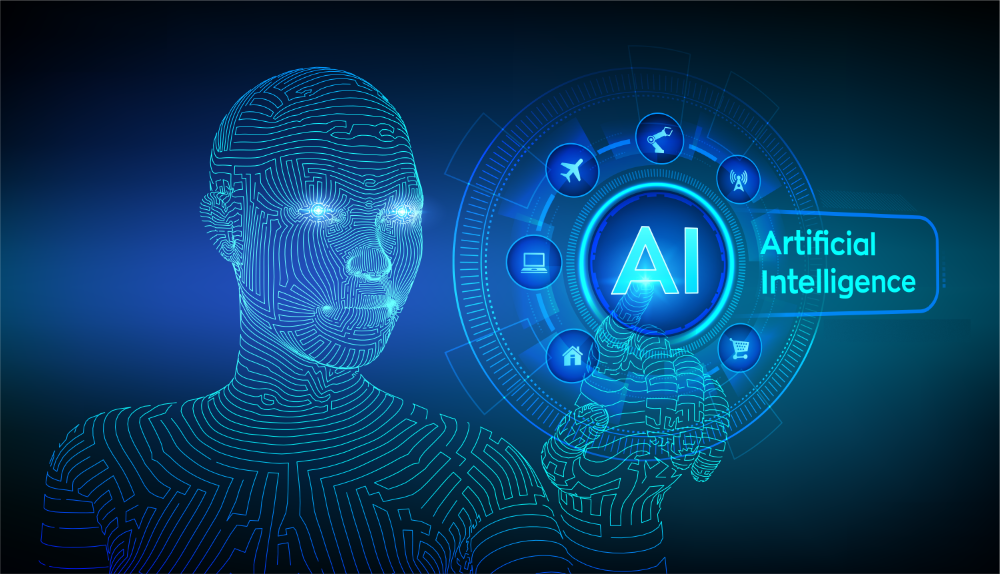
Artificial Intelligence (AI) is rapidly transforming the landscape of scientific research and discovery. Once a subject of speculative fiction, AI is now a practical tool that scientists and researchers use to tackle complex problems, analyze massive datasets, and even predict future discoveries. From drug discovery and climate modelling to astrophysics and genomics, AI plays a crucial role in accelerating the pace of scientific advancements. This blog explores the role of AI in advancing scientific research and discovery, focusing on its applications, benefits, challenges, and future potential.
The Evolution of AI in Scientific Research
1) A Brief History
AI’s journey from a theoretical concept to a practical tool in scientific research has been remarkable. Early AI systems, developed in the mid-20th century, were primarily rule-based and limited in their capabilities. These systems were designed to perform specific tasks like solving mathematical problems or playing chess. However, they could not learn and adapt, which limited their usefulness in scientific research.
The advent of machine learning (ML) and deep learning (DL) in the 21st century marked a significant turning point in AI’s development. These technologies enabled AI systems to learn from data, recognize patterns, and make predictions with increasing accuracy. As computational power grew and data became more abundant, AI’s potential to assist in scientific research became apparent.
2) The Integration of AI in Research
Today, AI is integrated into various stages of the scientific research process. It is used for data collection, analysis, modelling, and hypothesis generation. AI’s ability to process large volumes of data quickly and accurately has made it an invaluable tool for researchers in fields as diverse as biology, chemistry, physics, and social sciences.
AI’s impact on scientific research is particularly evident in data-intensive fields, where traditional analysis methods are often insufficient. For example, in genomics, the sheer volume of genetic data generated by sequencing technologies would be impossible to analyze without AI. Similarly, AI models complex systems in climate science and predicts future climate patterns.
Applications of AI in Scientific Research
1) Drug Discovery and Development
One of the most significant applications of AI in scientific research is drug discovery and development. Traditional drug discovery is a time-consuming and expensive process, often taking over a decade and billions of dollars to bring a new drug to market. AI has the potential to revolutionize this process by speeding up the identification of potential drug candidates and reducing costs.
- Target Identification: AI algorithms can analyze vast amounts of biological data to identify potential drug targets, such as proteins or genes associated with a particular disease. AI can help researchers identify the most promising candidates for further study by analyzing the interactions between molecules and these targets.
- Virtual Screening: AI virtually screens millions of chemical compounds to identify those most likely to bind to a target and produce a therapeutic effect. This process significantly reduces the number of compounds that need to be tested in the lab, saving time and resources.
- Drug Repurposing: AI can analyze existing drugs to identify new therapeutic uses. By examining approved drugs’ molecular structures and mechanisms of action, AI can suggest alternative applications, potentially leading to faster and more cost-effective disease treatments.
2) Genomics and Personalized Medicine
AI plays a crucial role in genomics, which analyzes and interprets vast amounts of genetic data. This has important implications for personalized medicine, where treatments are tailored to an individual’s genetic profile.
- Genome Sequencing: AI algorithms analyze the data generated by genome sequencing technologies. These algorithms can identify genetic variants associated with diseases, predict how individuals will respond to certain treatments, and identify potential new drug targets.
- Disease Prediction: AI is used to develop predictive models to assess an individual’s risk of developing certain diseases based on their genetic profile and other factors. These models can help doctors identify at-risk individuals and implement preventive measures.
- Personalized Treatment Plans: By analyzing genetic data, AI can help doctors develop personalized treatment plans tailored to each patient’s needs. This approach can improve treatment outcomes and reduce the risk of adverse effects.
3) Climate Science and Environmental Research
AI is making significant contributions to climate science and environmental research by enabling more accurate modelling and prediction of complex systems. These advancements are critical for understanding and addressing the impacts of climate change and environmental degradation.
- Climate Modeling: AI is used to develop sophisticated climate models that can more accurately simulate the Earth’s climate system. These models consider various variables to predict future climate patterns, including temperature, precipitation, ocean currents, and greenhouse gas emissions.
- Environmental Monitoring: AI analyzes data from satellites, sensors, and other sources to monitor environmental conditions in real-time. This includes tracking deforestation, monitoring air and water quality, and assessing the health of ecosystems.
- Predicting Natural Disasters: AI predicts natural disasters like hurricanes, floods, and wildfires. By analyzing historical data and real-time information, AI can help scientists predict when and where these events will likely occur, allowing for more effective disaster preparedness and response.
4) Astrophysics and Space Exploration
Astrophysics and space exploration generate massive amounts of data, much beyond human analysis. AI plays a key role in analyzing this data and making discoveries about the universe.
- Exoplanet Discovery: AI algorithms analyze telescope data to identify potential exoplanets—planets that orbit stars outside our solar system. These algorithms can detect subtle changes in a star’s brightness that indicate the presence of an exoplanet.
- Astronomical Data Analysis: AI analyses vast amounts of astronomical data, such as images of galaxies, stars, and nebulae. This analysis can reveal new insights into the structure and evolution of the universe.
- Space Missions: AI is used in space missions to assist with navigation, data analysis, and decision-making. For example, AI is used in the planning and execution of Mars rover missions, where it helps analyze data and decide where to explore next.
5) Social Sciences and Humanities
While AI’s impact on the natural sciences is well-documented, it also significantly contributes to the social sciences and humanities. AI analyses large datasets, identifies patterns, and generates new insights into human behaviour, culture, and society.
- Text Analysis: AI algorithms analyze large volumes of text, such as historical documents, literature, and social media posts. This analysis can reveal trends in language use, cultural shifts, and public sentiment.
- Predictive Modeling: In the social sciences, AI develops predictive models to forecast social and economic trends. These models can help policymakers make informed public health, education, and economic development decisions.
- Digital Humanities: AI is also being used in the field of digital humanities, where it analyzes and interprets cultural artefacts such as art, music, and literature. This analysis can provide new insights into the history and evolution of human culture.
Benefits of AI in Scientific Research
1) Accelerating Discovery
One of AI’s most significant benefits in scientific research is its ability to accelerate the pace of discovery. AI’s capacity to process and analyze large datasets quickly and accurately allows researchers to identify patterns, generate hypotheses, and test ideas much faster than traditional methods.
- Speeding Up Data Analysis: AI can analyze vast amounts of data in a fraction of the time it would take a human researcher. This allows scientists to make discoveries more quickly and move on to their next research phase.
- Automating Repetitive Tasks: AI can automate many repetitive tasks involved in scientific research, such as data entry, image analysis, and literature review. This frees researchers to focus on more creative and complex aspects of their work.
2) Enhancing Precision and Accuracy
Another significant benefit is AI’s ability to analyze data with high precision and accuracy. This is particularly important in fields where small errors, such as drug discovery or climate modelling, can have significant consequences.
- Reducing Human Error: AI algorithms are less prone to error than humans, particularly when analyzing large datasets. This reduces the risk of mistakes and increases the reliability of research findings.
- Improving Predictive Models: AI’s ability to identify patterns and correlations in data allows it to develop more accurate predictive models. This is particularly valuable in genomics and climate science, where accurate predictions are crucial for decision-making.
3) Facilitating Interdisciplinary Research
AI facilitates interdisciplinary research by providing tools that can be used across various scientific disciplines. This leads to new collaborations and discoveries at the intersection of different fields.
- Bridging Disciplinary Gaps: AI’s versatility allows it to be applied to various research questions, making it a valuable tool for interdisciplinary research. For example, AI can analyze biological and environmental data, leading to new insights into the relationship between genetics and climate.
- Fostering Collaboration: The use of AI in research is fostering collaboration between scientists from different disciplines. For example, AI researchers are working with biologists, chemists, and physicists to develop new algorithms and models that can be applied to various scientific questions.
4) Unlocking New Research Opportunities
AI is opening up new research opportunities by making it possible to analyze previously too complex or time-consuming data. This leads to discoveries and advancements in fields that were once considered out of reach.
- Big Data Analysis: AI’s ability to analyze big data unlocks new research opportunities in genomics, climate science, and astrophysics fields. Researchers can now analyze data on a previously impossible scale, leading to new insights and discoveries.
- Exploring New Frontiers: AI also enables researchers to explore new frontiers in science, such as discovering exoplanets or developing personalized medicine. These advancements are pushing the boundaries of what is possible in scientific research.
Challenges of AI in Scientific Research

1) Data Quality and Bias
One of the biggest challenges of using AI in scientific research is ensuring the quality of the data that is being analyzed. AI algorithms are only as good as the data they are trained on, and if that data is biased or of poor quality, it can lead to inaccurate or misleading results.
- Data Bias: AI algorithms can be biased if trained on data that is not representative of the population or phenomenon being studied. This can lead to biased predictions and results, seriously affecting healthcare or criminal justice.
- Data Quality: Ensuring the quality of data is also a significant challenge. In some fields, such as climate science, data may need to be completed, noisy, or inconsistent, making it difficult for AI algorithms to produce accurate results.
2) Interpretability and Transparency
Another challenge of using AI in scientific research is the interpretability and transparency of AI algorithms. Many AI models, particularly deep learning models, are often described as “black boxes” because humans do not easily understand their decision-making processes.
- Lack of Interpretability: The lack of interpretability of some AI models can be a significant barrier to their use in scientific research. Researchers may hesitate to rely on AI algorithms if they need help understanding how they arrived at their conclusions.
- Need for Transparency: There is a growing need for transparency in AI research, particularly in fields with high stakes, such as healthcare or climate science. Researchers and policymakers need to understand how AI algorithms make decisions to ensure they are fair, accurate, and reliable.
3) Ethical Considerations
The use of AI in scientific research also raises important ethical considerations. These include privacy, consent, and the potential misuse of AI technologies.
- Privacy and Data Security: Using AI in research often involves collecting and analyzing large amounts of personal data. Ensuring the privacy and security of this data is a significant ethical challenge, particularly in fields such as genomics or healthcare.
- Informed Consent: Obtaining informed consent from research participants is also an important ethical consideration. Participants must be fully informed about how their data will be used and can opt-out.
- Potential Misuse of AI: Another ethical concern is the potential misuse of AI technologies. For example, AI algorithms could be used to develop autonomous weapons or conduct mass surveillance. Ensuring that AI is used for the benefit of society and not for harmful purposes is a critical ethical challenge.
The Future of AI in Scientific Research
1) Continued Advancements in AI Technology
Continued advancements in AI technology will likely shape the future of AI in scientific research. As AI algorithms become more sophisticated and computational power continues to grow, AI’s potential to assist in scientific research will only increase.
- Next-Generation AI Algorithms: Developing next-generation AI algorithms, such as quantum machine learning or neuromorphic computing, could revolutionize scientific research by enabling even more complex and accurate analysis.
- Improved Data Integration: Advances in data integration techniques will allow researchers to combine data from multiple sources and domains, leading to more comprehensive and accurate models.
- AI-Driven Discovery: AI may also play a more active role in the discovery process, generating new hypotheses and identifying potential areas of research that still need to be explored.
2) Greater Integration with Human Researchers
AI’s future in scientific research will likely involve greater integration with human researchers. Rather than replacing scientists, AI is expected to serve as a tool that enhances human creativity and problem-solving abilities.
- Collaborative AI: Developing collaborative AI systems that can work alongside human researchers will likely become more common. These systems could assist with tasks such as data analysis, hypothesis generation, and experiment design, allowing researchers to focus on more creative and strategic aspects of their work.
- Human-AI Synergy: The future of scientific research may involve a greater emphasis on human-AI synergy, where AI and human researchers complement each other’s strengths. For example, AI could handle the analysis of large datasets, while human researchers provide the intuition and creativity needed to interpret the results and develop new ideas.
3) Ethical and Regulatory Frameworks
As AI plays a larger role in scientific research, developing ethical and regulatory frameworks will become increasingly important. These frameworks must address data privacy, algorithmic bias, and the responsible use of AI technologies.
- Ethical Guidelines: Developing ethical guidelines for using AI in scientific research will be critical to ensuring that AI is used responsibly and fairly. These guidelines should address issues such as informed consent, data privacy, and the potential for algorithmic bias.
- Regulatory Oversight: Regulatory oversight will also be necessary to ensure that AI technologies are used safely and ethically. This could involve establishing standards and regulations for developing and using AI algorithms in scientific research.
4) Expanding Access to AI Tools
AI’s future in scientific research will also likely involve expanding access to AI tools and technologies. This could involve making AI tools more user-friendly and accessible to researchers who may not have a background in AI or computer science.
- Democratizing AI: Efforts to democratize AI, such as developing open-source AI tools and platforms, will ensure that AI’s benefits are accessible to all researchers. This could help to level the playing field and enable more diverse and innovative research.
- AI Education and Training: Expanding AI education and training programs will also equip researchers with the skills they need to use AI effectively. This could involve developing specialized courses, workshops, and online resources.
AI is playing an increasingly important role in advancing scientific research and discovery. Its ability to process and analyze large amounts of data quickly and accurately revolutionizes diverse areas such as drug discovery, genomics, climate science, astrophysics, and social sciences. While there are challenges to overcome, such as data quality, interpretability, and ethical considerations, the future of AI in scientific research is bright. Continued advancements in AI technology, greater integration with human researchers, the development of ethical and regulatory frameworks, and expanding access to AI tools will all play a crucial role in shaping the future of scientific research and discovery. As AI continues to evolve, it will undoubtedly lead to breakthroughs and innovations that will transform our understanding of the world and the universe.


